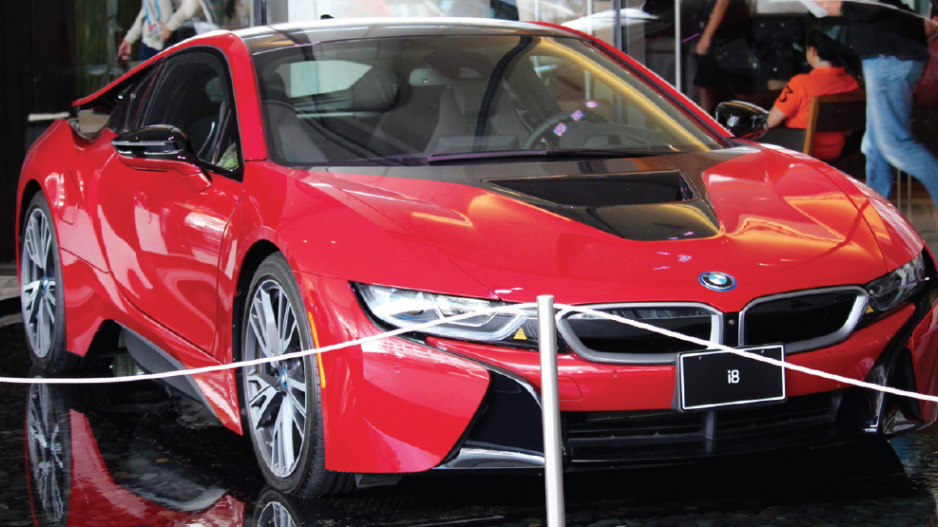BMW Canada is calling for more police presence at Canadian ports to stem the rising tide of trade-based money laundering, including its own luxury vehicles.
The company stopped short of calling for the reinstatement of a dedicated police force for the ports, but it alluded to the problems that have arisen as a result of the demise of the Ports Canada Police in 1997.
“Canadian ports, including Vancouver, Surrey and Prince Rupert do not have dedicated police presence, therefore resulting in a gap in law enforcement,” said BMW representative Morgan Camley, speaking Tuesday to Justice Austin Cullen, commissioner for the independent Commission of Inquiry into Money Laundering in British Columbia. “Thjs makes it more difficult for BMW to identify vehicles destined for unlawful export.”
Camley told Cullen of how BMW’s 12-month non-export sales agreements, such as on the X5 and X7 branded vehicles, are being flouted by so-called “straw buyers” who are frequently providing bank drafts to dealers under suspicious circumstances.
“The circumstances in which the bank draft is sent to BMW are routinely suspicious, leading BMW to suspect the vehicle has already been transferred to an unknown third party, without BMW’s consent,” said Camley.
Asked by Cullen if BMW’s interest is in preventing foreign markets from being undercut, Camley confirmed this was the case but also took the position that BMW’s brand is being tarnished in B.C. with increased focus on money laundering. As well, the company is concerned about money laundering in and of itself, she said.
Purchase agreements allow BMW to track its vehicles by GPS under certain circumstances, Camley said. The company may be alarmed if a vehicle enters areas around ports of entry. However, policing the fast-growing grey market of vehicle exports to China has exhausted the company’s resources, she said. Illegal exporters often disable the car’s GPS system, Cullen was told.
“Currently the industry, BMW and its retail network must dedicate its own resources to this problem without being able to rely on any regulatory framework,” Camley said, adding BMW has filed civil claims against four people last year over breach of contract for exporting vehicles.
She said one vehicle BMW recovered at a local port facility had 10 kilometres on it, meaning it went directly from the dealer to the waterfront.
“In BMW’s experience enforcement and transparency at ports should be dramatically improved.
“BMW seeks the work of the commission to develop recommendations in relation to increasing assistance and enforcement at Canadian ports.
“Specifically BMW asks the commission to consider recommending that the provincial and federal governments regulate the export of vehicles from British Columbia and Canada.”
Camley outlined much of what has been stated in the report Dirty Money by Peter German, former RCMP Assistant Commissioner and financial crime legal consultant.
German’s report noted that while dedicated police are absent at the ports, “it has been alleged for many years that outlaw motorcycle gangs have a strong presence on Greater Vancouver waterfronts, particularly in terms of container traffic.”
With respect to the illegal export scheme, the report said there has been “an explosion in the number of grey market vehicles exported to China since 2013, growing from less than 100 vehicles in 2013 to over 4,400 vehicles in 2018.”
These figures were determined by looking at provincial sales tax refunds on luxury cars.
According to the report, if the cars purchased by straw buyers are resold to the exporters within seven days of purchase, then the provincial government refunds the PST.
Camley said this should worry British Columbians.
“In this way the vehicle grey market scheme interferes with the legitimate economy. The commission and the people of British Columbia should be troubled by what is happening. BMW is troubled,” said Camley, whose vehicles are taxed between 10 % and 20 %, depending on the value.
“Since 2013, almost $85 million in PST refunds have been paid by government for the export of vehicles,” according to the B.C. attorney general. “The source and destination of funds for the buyers and sellers, and any income tax reporting by any of these individuals or entities, is unknown.”
In the end, layers of transactions obscure source of funds and those who benefit from them.
Aside from the illegal exporting aspect, the luxury car reselling sector is also prime territory for money launderers due to the lack of transaction oversight.
Noted one police investigator quoted in the report: The well-known gangster “wouldn’t be able to get a liquor or casino licence, but he can own a car dealership.”
One of German’s key findings is that luxury car dealers are not required to file suspicious transactions of over $10,000 cash with the Financial Transactions and Reports Analysis Centre of Canada.
“There’s no visibility at the point of sale,” said German. “It’s a wonderful opportunity to launder money.
The report found 1,000 “straw buyers” connected to a single exporter.
The report claims international students, or those “appearing” to be students, make up a large portion of straw buyers.
This phenomenon coincides with, as Camley stated, Vancouver being dubbed the “luxury car capital of North America.”
“Not only is there a huge demand for luxury vehicles in British Columbia. There is a demand for luxury housing of luxury vehicles. A development called The Trove in Richmond is currently selling auto storage condominiums to luxury car owners.”
Base cost per unit is $600,000.




